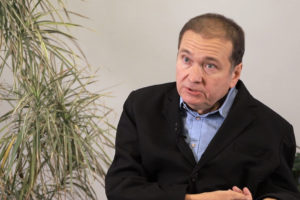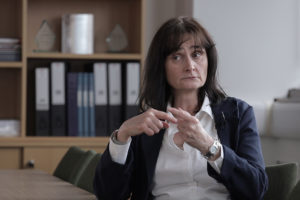Why does music get stuck in our heads?
Psychologist Lauren Stewart on earworms, their features and function
Autism is a condition that has a basis in the genes, a basis in the brain. It is lifelong, it affects about one in a hundred people, we believe at the moment. It’s very very heterogeneous, each individual is different from the next. But from even the earliest descriptions of autism, it was noticed that at least in some cases there are indications of special talents, and the idea is that this is true for about a third of the cases. Which is a large group, but it’s not everybody. So this marks a kind of classic autism. You have ups and downs, strengths and weaknesses in your cognitive profile. And these are very sharp in the case of autism, so you might find that they are extremely talented, for example, in memorizing certain things, and not at all talented in some other aspects of life, for example, understanding rules of behavior in general.
A kind of stickiness once they focused in it is really hard to get the bigger picture, to zoom out again, which is something that again that we do without noticing. In fact, we attend to the world in a way that enables us to think of the whole picture, and also to zoom in whenever it’s necessary onto the detail. Sometimes, we are not so good at finding the detail and that’s where the autistic people have an advantage very often. And remember: I’m not talking about every single autistic person, but maybe about a third of autistic people. So they will be able, for example, to have pitch-perfect tone memory, an absolute pitch.
It’s very interesting that they can do that, because for us it’s the context that determines the pitch. So we wouldn’t know whether a particular song is changed slightly from one day to the next, it would seem to us the same as long as the whole melody is there. The whole is what is important to us and the individual tone is relative. But it seems that in the case of this detail focus it’s the absolute pitch that’s the important thing. It’s not relative, it’s absolute, it’s fixed in your memory.
We’ve also found that this focus on detail, this ability to focus is not necessarily always connected with autism, you can find it in non-autistic people. And very interestingly, you can find it quite often in parents of autistic children. So we have conducted a study where we gave the same kinds of test to the parents as to the children, and we found in this case that it was particularly the fathers who tended to have that kind of attention focus that was more on detail than on the whole picture.
There is something about looking at the whole picture that gives us a kind of overall meaning of things. So if you are asked to tell the gist of a film that you saw, you can say it in a few brush strokes, you can say it was the story about this, such, and the other and that’s it. But if you have that gift to really focus on the every detail, you will be able to tell everything blow-by-blow, but you may in the extreme case lose what it was actually about. So people are talking about not seeing the wood for the trees. And that could apply in these rather extreme cases.
Detail focus, attention in autism is very typical of the classic case of the autistic person, who is actually quite able in certain aspects, in certain abilities and uses them. But it’s very very different in different individuals and you don’t find it in all autistic people, so it’s a particular cognitive style, a particular cognitive phenotype which differs between individuals. There is a lot of research going on in this area. It has been a very fruitful topic in order to find out how in fact we extract meaning in general from the world, meaning in a sort of overall sense.

Can we build that meaning from tiny detail? Probably not so efficiently. Can we miss a lot of things if you only look at the big overarching things? Yes, we can miss a lot of things. So there are tradeoffs that are quite clear that we need to address and to think about. It’s interesting that this different style of attention is distributed throughout the whole population. So you can classify yourself as a person who looks at detail. Are you a person who notices all kinds of little errors when you are proofreading a manuscript? Then you probably on the side of the details focus interest. Are you a kind of person thinks “that looks all right to me, I can’t see anything wrong with it”? You may well be on the side of the big picture, broad gist kind of people. So it’s interesting to look at it in terms of possibly personality characteristics and this hasn’t really been done yet.
There is a lot of work to be done here. We really have very few studies to see what the brain does when we focus our attention on detail. We really don’t know what the costs are of doing that and what the costs are of looking at the big picture. When we look at the big picture, there is no doubt that we lose an enormous amount of information that we are not aware of. And it’d be really interesting to find out how the brain can construct the world from data gained in in this sort of very flexible way that we normally use in order to focus or zoom out or attention.

Psychologist Lauren Stewart on earworms, their features and function

Neuroscientist Onur Güntürkün on mammalian brain, ravens’ ability to plan into future and why birds are so int...

Physicist Michele Dougherty on the planetary dynamo, Cassini’s flybys of Saturn and why the nature of the magn...